Month 8:29, Week 4:7 (Shibi'i/Sukkot), Year:Day 5949:235 AM
2Exodus 6/40
Gregorian Calendar: Sunday 27 October 2019
New Testament Studies
The Complete Messianic Evangelical
New Testament Phronema Study Series
7. Prayer, Celebrity & a Leper (Mark 1:35-45)
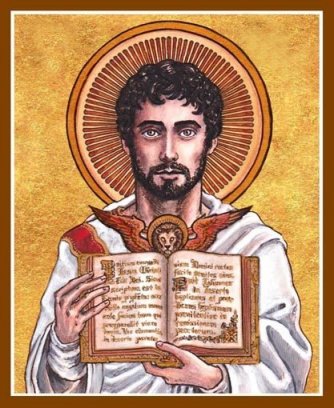
Continued from Part 6 (Mark 1:21-34)
Introduction
Shabbat shalom and welcome to the seventh part of this New Testament Phronemic Study Series. We have now entered the phase of the Galilean ministry which took us to Capernaum in the very north of the country. From now on we are heading south until we arrive at the final destination, Jerusalem, and to the Cross in an ever accelerating train-like journey which begins with Yah'shua (Jesus) the miracle-worker becoming extremely popular to arousing hostility leading finally to the conspiracy to murder Him. Last time we saw that His teaching in the synagogue and his handling of a possessed man convey upon Him an extraordinary toqef or authority.
The Choosing of Capernaum
As promised last week, we will start today by taking a look at the town of Capernaum. In older English translations it's called a 'city' but in reality is was, by modern standards, a small, flourishing little frontier town on the north-west shore of the Sea of Galilee. It was the place that Yah'shua (Jesus) decided to make the centre of His ministry. Small and remote from Jerusalem though it may have been, nevertheless in those days it was considered to be of importance and this may be a reason Yah'shua (Jesus) chose it as a semi-permanent base or headquarters. It's actually a lovely location too, far from the bustling crowd and political intruigue in Jerusalem but not so remote that there isn't a cross-section of society to be found.
The Cursing of Capernaum
Unfortunately, like Chorazin and Bethsaida, both northwards and inland, Capernaum would not itself be fruitful as we read in this rebuke:
"Woe to you, Chorazin ('Korazin' - NIV, HRV)! Woe to you, Bethsaida! For if the mighty works which were done in you had been done in Tyre and Sidon (in pagan Phoenicia), they would have made teshuvah (repented) long ago, sitting in sackcloth and ashes. But it will be more tolerable for Tyre and Sidon at the judgment than for you. And you, Capernaum, who are exalted to heaven, will be thrust down to Hades. He who hears you hears Me, he who rejects you rejects Me, and he who rejects Me rejects Him who sent Me" (Lk.10:13-16, NKJV).
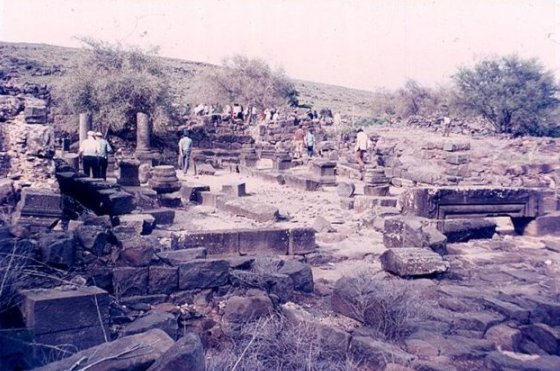 The cursed city of Chorazin, still abandoned today
The cursed city of Chorazin, still abandoned today
A Specimin Day in Capernaum
Perhaps that is why Mark only shares what D.E.Nineham calls "a specimin day" in Capernaum - he recorded what he thought was a representative sample of the most spectacular stuff and then moved on.
Residents of Note
But back to Capernaum itself. It had a tax office where Matthew was called to be a talmid (disciple) (Mt.9:9) and it was in all likelihood a military post too, because we learn from Matthew's Gospel that one of its residents was a centurion (Mt.8:5). The attendant to the king Herod Antipas, who had slaves, lived there as well (Jn.4:46-53) and that is probably why it is referred to as "a city ('town' - KNT) of Galilee (Aram. 'Galeela', Heb. 'Galil')" (Lk.4:31, NKJV).
The Village of Comforting
Might there, do you think, be a prophetic reason Yah'shua (Jesus) also chose this place? It's a possibility, given the meaning of the name 'Capernaum' which comes from the Hebrew, K'far Nachum, or the 'Village of Nahum'; and you will remember that Nahum was one of the so-called 'minor nevi'im (prophets)' whose name means 'Comforting'. So Capernaum literally means 'city, town, or village of comforting'. And perhaps it was given that name because of its beautiful location - a place to soothe or comfort the eyes, and the whole soul.
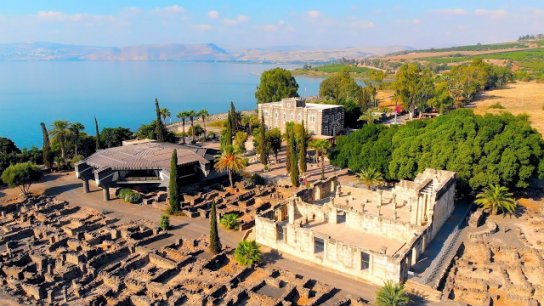 Capernaum today - the beauty of its location is self-evident
Capernaum today - the beauty of its location is self-evident
Yah'shua the Comforter
Given that the apostle John would later describe Yah'shua (Jesus) as the 'Paraclete' (a Greek-derived word) (Jn.19:16,26; 15:26; 16:7; 1 Jn.2:1), which in most modern translations we render as "Advocate", is also rendered "Comforter" in other versions. Passively, the Greek word paraklétos means one called to 'stand beside someone', particularly in a law court (though as a friend of the accused rather than as a professional pleader); and given that is what Yah'shua (Jesus) did in His ministry, standing beside the humble who were willing to repent in the spirit of John the Baptist and be brought into the Kingdom and to salvation, I will leave it to you to decide whether there is a prophetic significance in the Saviour's choice to make this His Galilean headquarters that 'stood beside' the glimmering waters, where already amazing grace has been extended to the diseased and distressed. As we get into each of the three Galilean ministries I think you will see with even great clarity the spiritual significance of this name. So remember, 'Capernaum', 'K'far Nachum', the 'place of comforting'!
Jonah and Nahum Compared
But like most prophecy, it's a double-edged sword. Nachum may very well have meant 'comforting' and Yah'shua (Jesus) was certainly a Comforter to the saved, but the message of the navi (prophet) Nahum himself was not a happy one. Like Jonah, he brought a message to Nineveh, the capital of Assyria. However unlike Jonah who hated the Ninevhites, whose message was received by the Ninevehites leading to repentance, Nahum - whose name means 'comforting' who was an obedient servant of Yahweh with a right heart - Nahum brought a message of destruction to a nation whom he depicted as a prostitute, enticing the nations into submission. 'Capernaum the beautiful' heard the Besorah (Gospel) but, in spite of seeing so many miracles, rejected it anyway and came under the same condemnation as Chorazim and Bethsaida. So the name is a double message, a twin prophecy, of comforting and condemnation.
Mark 1:35-45
Today's text is Mark chapter 1, verses 35-45. I'm going to first read it to you in N.T.Wright's Kingdom New Testament (KNT) translation and then, as usual, we'll go through it, line by line, in the New King James Version (NKJV). The evening before this text begins, you'll remember, had been a busy time with seemingly the "the whole city [of Capernaum/K'far Nachum]...gathered around the door" (Mk.1:33, NRSV) of Yah'shua's (Jesus') home. We can assume Yah'shua (Jesus) had been up late "cur[ing] many who were sick with various diseases, and cast[ing] out many demons" (Mk.1:34a, NRSV). And again, to remind you, "He would not permit the demons to speak, because they knew Him" (v.34b, NRSV).
"Very early - in the middle of the night, actually - Yah'shua (Jesus) went out, off to a lonely place, and prayed. Simon (Peter), and those with him, followed. When they found Him, they said, 'Everyone is looking for You!'
"'Let's go off to the other towns around here,' Yah'shua (Jesus) replied,' so that I can tell the news to people there too. That's why I came out.'
"So He went into their synagogues, throughout the whole of Galilee, telling the news and casting out demons.
"A leper came up to Him. He knelt down and begged Him, 'If you want to, you can make me clean!'
"Yah'shua (Jesus) was deeply moved. He reached out His hand and touched him, and said to him, 'I do want to: be clean!' The disease left him at once, and he was clean.
"Yah'shua (Jesus) sent him away at once, with the stern warning: 'Mind you don't say anything to anyone! Just go and show yourself to the cohen (priest), and make the offering Moses commanded, to purify yourself and to give them a sign.'
"But the man went out and began to tell the news widely. He spread the tale so effectively that Yah'shua (Jesus) couldn't any longer go publicly into a town. He stayed out in the open country, and people came to Him from all around" (Mk.1:35-45, KNT; cp.Mt.8:1-4; Lk.5:12-16).
The Practice of Early Morning Prayer
OK. He's been up late healing and delivering. How late, we don't know. In ancient times it was common for ordinary labouring men and women to go to bed at sunset and arise at sunrise as there wasn't much else to do at night except talk, and burning oil for light was expensive, though they may have sat outside with family and friends round a camp fire. Some people used to get up at midnight for an hour to pray and then go back to sleep again, breaking the night up into two chunks of time. The roosters would have woken them up at dawn, around 5.30 to 6.30 am (depending on the time of year) for another day's work. Likewise, sunset was betweenm 5.30 and 6.30 pm (also depending on the time of year). Of the Saviour we're told:
"Now in the morning, having risen a long while before daylight, He went out and departed to a solitary place; and there He prayed" (Mk.1:35, NKJV).
'I Rise Before Dawn...'
So presumably He didn't get a lot of sleep. We're not told what time He got up but we can assume it was pretty early, before sunrise 5.30-6.30 am, so maybe He was up between 4 and 5 am. This was not a new practice that Yah'shua (Jesus) introduced. Rather, He was doing what all pious Yehudi (Judahites) of that time did which was to rise early for prayer before eating breakfast and going to work. This had been happening for generations. Thus we read in the Psalms:
"In the morning, O Yahweh, You hear my voice;
in the morning I lay my requests before You
and wait in expectation" (Ps.5:3, NIV)
"But I cry to You for help, O Yahweh;
in the morning my prayer comes before You" (Ps.88:13, NIV).
"I rise before dawn and cry for help;
I have put my hope in your word" (Ps.119:147, NIV).
A Sizeable Chunk of Yah'shua's Daily Activity
Yah'shua's (Jesus') getting up early and withdrawing for solitude and prayer points up His dependence on Yahweh, the only true source of His toqef (authority). Mark's Gospel, remember, is an 'action' or 'doing' gospel and he wants us, the reader, to be aware of one of Yah'shua's (Jesus') important 'doings'. This information may only take up a line of text but if it occupied more than just a few minutes every morning - and I know people who spend hours praying early in the morning - then this would have taken up a sizeable chunk of His daily activity.
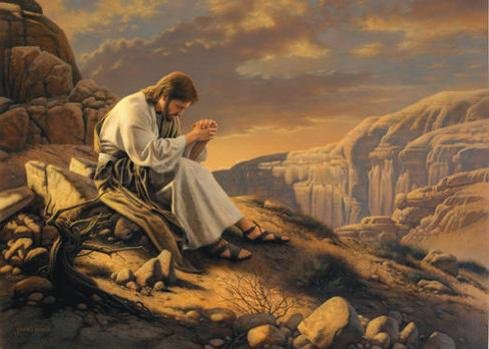 Yah'shua (Jesus) at prayer in the wilderness of Galilee early in the morning
Yah'shua (Jesus) at prayer in the wilderness of Galilee early in the morning
A Source of Power and Authority
Some translations render this passage, saying that He got up "in the morning, a great while before day" (RSV), "long before the night had gone" (Barclay), and "long before daybreak" (NLT), so we're talking an hour or two (or even more) while it was "still dark" (NEB). So why is Yah'shua (Jesus), the Son of Elohim (God), doing this and why is Mark pointing it out to us? I don't doubt the ever attentive Peter and companion of the Master observed this behaviour many times. In the context of what we studied last week, what this may be telling us is that this early morning communion time was in some way - in part or in whole - the source of the Saviour's authority and power.
Authority, Communion and Obedience
'Having authority' isn't just some 'right' or 'legal thing' given to believers merely because of passive believing or because of some implied magic in the word 'Jesus' (which is a dangerous occult idea espoused by the charismatic movement), because authority is also a function of obedience, so how are you going to know what to obey if you don't know the mind and heart of Elohim (God) through regular communion with Him and/or if you haven't first got your marching orders from Him for each day?
Billy Graham and Leonard Ravenhill and Prayer
Billy Graham, whatever you may think about him personally, once related when asked what he would do differently if he could relive his life again, said without hestitation that he would spend far more time in prayer than he ever did. Reading and listening to Leonard Ravenhill, I haven't the slightest doubt that this evangelist would have heartily agreed too. I dare say we have all fallen short in this area of our Christian/Messianic life (and in so many ways suffered for our negligence of it too) so I hope these remarks will encourage you to make some extra effort in this direction. If the Saviour thought it so important then evidently it must be.
Mighty Works Were Never the Main Thing
Hugh Anderson believes the reason John Mark - and thus indirectly the apostle Peter - tells us about this habit of early morning prayer is because he wants to enforce the lesson conveyed by the 'messianic secret' (Mk.1:34) that we talked about earlier, namely, that fascination with Yah'shua's (Jesus') mighty works - His healings and exorcisms - is not the desired outcome of his ministry. They're not by any means unimportant, of course, but the 'main thing' is not signs and wonders (because they never lead to conversion in themselves) but atonement for sin on the Cross and therefore salvation and Israel's - and therefore mankind's - deliverance from death. He must have known early that that was His main reason for being incarnate on earth and that, one supposes, would have required a lot of mental, spiritual and physical preparation - daily, early morning prayer for several hours over the course of three years, His closely guarded secret - the 'messianic secret' - a heavy burden to bear even before the start of the Gethsemane experience right at the end of His life. Nevertheless the mighty works were a testimony to the scoffers and doubters (leading to their judgment for unbelief) as well as a blessing to the true believers.
A Demanding Lifestyle as a Human Being
Now you and I do not need to prepare for anything as great and marvelous as that (since we can't atone for anything) but we ought to at least make preparations for each day, which would have been part of the reason Yah'shua (Jesus) communed with Yahweh every morning too. Every day was a busy day for Him. People were either thronging around Him for teaching, healing or exorcism and that, as we know, takes a lot of energy. We're told later on in chapter 5 that when He healed the woman with an issue of blood that He felt the power draining from Him (Mk.5:25-34). Remember, that though Yah'shua is, and was, Elohim (God), He was Elohim (God) in the flesh, which meant that in His physical body He was a finite being like us too. Like us, He grew tired and needed to recharge His batteries. Any and every kind of service He gave depleted Him of energy which He needed to replenish through adequate sleep, sensible and regular eating, and solitude in prayer with His Heavenly Father.
Christianity is Practical Too
So this single sentence not only tells us a lot but is extremely important too. A well-lived and productive life is also extremely practical. Acquiring the discipline to get adequate sleep, and proper nourishment - physical and spiritual - is very important not only to our personal well-being but to our ability to effectively serve. As the Psalm says, "[Yahweh] grants sleep to those He loves" (Ps.127:2b, NIV). Therefore, do not be like the same man the Psalmist is describing in the line before, "in vain you rise early and stay up late, toiling for food to eat..." (v.2a, NIV), for indeed it would be vain - pointless - if you destroyed yourself - your health - in the process as much of humanity alas does.
Down Tools When You Need To
Sometimes we just need to down tools and go and rest, or eat, or drink, or pray, or all of these. And remember, prayer is just as important as food and sleep to the welfare of your soul. Yahweh does not want martyrs to indiscipline and stupidity - and I say that as one who has foolishly driven himself too hard and all too frequently for which I am paying a heafty health price in my latter years. I have, as my mother used to warn me not to do, been burning my candle at both ends. Finding the balance - not too much, and not too little - is the main thing. That's one of the reasons Yahweh has given us the sabbath day of rest. Regular habits make it easier on the physical body, enabling it to cope and to heal and replenish itself. This ought to be common sense but we are uncommonly irrational and stupid at times. Don't follow my example, follow Yah'shua's (Jesus'), at least in this matter!
Searching for Yah'shua the Wrong Way
Now you might think that acquiring such discipline was a simple matter for Yah'shua (Jesus) but you would be wrong. He was under pressure all the time, and not untypically from His own talmidim (disciples)! Our loved ones and best friends can be the most demanding on us! Even in today's passage we see an example of that, though you might not at first see it. So let's read on:
"And Simon (Peter) and those who were with Him searched (Gk. zétousin) for Him. When they found Him, they said to Him, 'Everyone is looking for You.' But He said to them, 'Let us go into the next towns, that I may preach there also, because for this purpose I have come forth.' And He was preaching in their synagogues throughout all Galilee, and casting out demons" (Mk.1:36-39, NKJV).
Christ is Hunted Down by the First Century Paparazzi
I want to draw your attention to the word "searched" (Gk. zétousin) (NKJV, OJB, JBP) or "were looking for" (AENT, HRV). The English verb in these translations is far too weak. The CJB/JNT says "went after". The NRSV uses "hunted" - "Simon and his companions hunted for Him" (Mk.1:36, NRSV) which is much better and the best translation I have seen thus far, but the verb is still not nearly strong enough. This word zétousin is used in 9 other places in Mark and it is always derogatory - it refers to actual persecution or to seeking Yah'shua (Jesus) in a wrong and unacceptable way (see Mk.3:32; 16:6). The NRSV "hunting" is good, because it has an element of violence in it, but really what we're being told here is that the talmidim (disciples) are treating Yah'shua (Jesus) like a celebrity or superstar and are hunting Him down like those intrusive photographers of the 1960's and onwards called paparazzi. And the crowds were no different. Can you understand why He sought out solitude early in the morning? He knew He would get none by day. Maybe you can understand why later He said, "Foxes have holes and birds of the air have nests, but the Son of Man has nowhere to lay His head" (Mt.8:20; Lk.9:58, NKJV).
The Cleansing of the Leper
And so we come to the final section of today's passage:
"Then a leper came to Him, imploring Him, kneeling down to Him and saying to Him, 'If You are willing, You can make me clean.' And Yah'shua (Jesus), moved with compassion, put out His hand and touched him, and said to him, 'I am willing; be cleansed.' As soon as He had spoken, immediately the leprosy left him, and he was cleansed. And He strictly warned him and sent him away at once, and said to him, 'See that you say nothing to anyone; but go your way, show yourself to the cohen (priest), and offer for your cleansing those things which Moses commanded, as a testimony to them.' But he went out and began to proclaim it freely, and to spread the matter, so that Yah'shua (Jesus) could no longer openly enter the city, but was outside in deserted places; and they came to Him from every quarter" (Mk.1:40-45, NKJV).
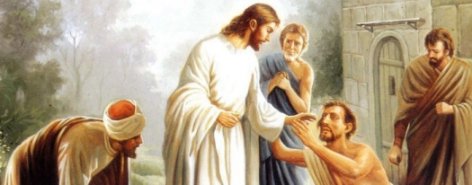 Yah'shua cleanses the leper and triggers important prophetic processes
Yah'shua cleanses the leper and triggers important prophetic processes
More Authority and Social Barriers Destroyed
Another incredible miracle! Two things stand out here:
- 1. His divine toqef (authority) becomes irrepressibly greater because not only does He heal one of the worst, most loathsome of diseases known to man, but
- 2. In so doing, He eradicates barriers between those within and those outside of 'respectable' Yehudi (Judahite) society - the healed, cleansed man could finally leave the leper colony and once again (after priestly certification) mingle with society!
So in a way, this is a fitting climax to the series of events dealing with Yah'shua's (Jesus') authority over demons and disease in Mark 1:21-39 and a suitable introduction to His controversies with the Judean authorities which we'll see next week and beyond (Mk.2:1-3:6).
Between Cleansed and Healed
You may have noticed that the word "cleansed" is used here of this particular disease rather than "healed" even though both things were happening simultaneously. Because the disease was so contageous, lepers had to be completely isolated. They could neither enter a dwelling place nor have any kind of communication with other people. They were also required by the Torah (Law) to give warning of their approach by shouting, "Unclean, unclean!" (Lev.13:45-46, NRSV), and in the unlikely event of their being cured, they had to obtain a certificate of ritual cleanliness from the cohen (priest) and offer the prescribed sacrifices (Lev.14).
A Deeply Moving Account
That aside, there are also very strong emotional overtones - indeed, because of the detail, it's so lifelike that once again the witness of Peter is unmistakable. This isn't just an historical account. You see, the leper has broken all customary regulations in approaching Yah'shua (Jesus) without warning because he is supremely confident - his emunah (faith) is so strong - that he is convinced the Master's power will be sufficient to heal and cleanse him. He is committed unreservedly! So once again we are able to connect to the phronema and there can be little doubt that the listeners would have been deeply moved emotionally hearing this story.
Moved to Anger Too
But there's another word curiosity here, and that concerns the verb "pity" which most translators use - "Moved with pity (also CJB/JNT, ESV, JBP), Yah'shua (Jesus) stretched out His hand and touched him..." (Mk.1:41, NRSV) - the NKJV and others (e.g. AENT, HRV, CLNT) use the word "compassion", what in modern Hebrew would be called rachmei Shomayim or 'heavenly compassion and mercy' (OJB), and I am not arguing with either of these renderings in the least - but, you see, there are other manuscripts (MSS) where the Greek translator(s) struggled with the original Hebraic text because of multiple layers of meaning and instead translated that Yah'shua (Jesus) was "moved to anger".
An Emotionally Charged Situation
This is a very emotionally charged atmosphere! Not only is the Saviour stirred in His bowels with compassion, but mingled with the pity, compassion and mercy is raw anger. But anger at what? At the leper interrupting His preaching ministry? I doubt that. His breach of the Torah regulation? Possibly, but I think unlikely since He would have known the man's heart, his faith, and in a split second would have already decided to heal him (so there would have been no danger of contamination either to Himself or the crowd He was talking to - I mean, He went and touched the leper!). What, then, could have angered Him?
When Elohim Gets Angry
We know that Yah'shua (Jesus) got angry several times during His mission and yet never sinned (Heb.4:15), just as we are permitted to be angry so long as we do not sin (Eph.4:26). In other words, there is such a species as righteous anger. Yah'shua (Jesus) got angry because of the ungodly attitudes of others around Him just as His Father, and ours, got angry many times in the Tanakh (Old Testament) when people sinned against Him and injustices took place in the world. Yet though He was angry on occasion, He was never known as an angry person.
Angry at Sickness and Death
So what, do you think, Yah'shua (Jesus) might have been angry at here? And why was compassion and pity comingled with this anger? It is my view that Yah'shua (Jesus) was angry at the leprosy itself which alienated people from one another, He was angry at disease, and He was angry at death which was often the result of such disease, and for such He came to die. Many times I have got angry over seeing disease and the suffering it causes to others as well as feeling broken-hearted for those suffering because of that disease. Seeing Alzheimer's and cancer will do it. I have a feeling that when Yah'shua's (Jesus') friend Lazarus died He was both broken-hearted at the loss of His friend and angry at death itself for having stolen a precious life. In a similar way to the leprous man, Yah'shua (Jesus) responded with the most spectacular miracle up to that time - He raised Lazarus from the dead (Jn.11-12). And I would like to suggest that this particular kind of anger is unique, because it can only ever exist comingled with the deepest of ahavah (love).
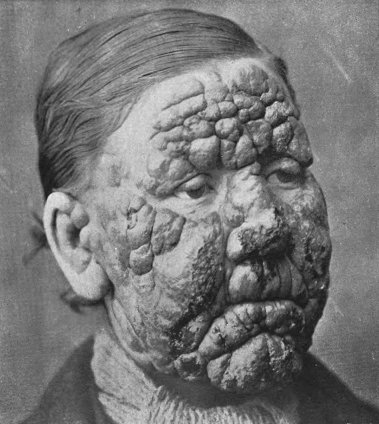 The horror of leprosy. The last leper colony
The horror of leprosy. The last leper colony
in the USA, in Louisiana, closed in 2015
A Broken Promise and the Ministry Driven into the Wilderness
Well, many more miracles followed because He never turned anyone away who had a genuine need. It got so 'bad', once the healed leper broke his promise not to tell anyone except the local cohen (priest), that Yah'shua (Jesus) couldn't not only minister in Capernaum but He couldn't even minister in the hamlets in the countryside where the population was thinner. Indeed, the text says that He had to minister "in deserted ('desolate' - ESV, CLNT; 'lonely' - JBP) places" (v.45b, NKJV, RNAB, AENT, HRV), "in places where nobody lived" (JB), or " in open country" (KNT, NEB).
White Magic Counterfeits
I want you to notice, once again, that none of the demon-mediated Hellenistic wonder-working that was common at the time through the occult arts took place. Indeed they were conspicuous by their absence. There was none of the theatrics that you see in the modern charismatic movement. A word from Yah'shua (Jesus) was enough. It is only when a person does not have heavenly authority that he is reduced to showmanship, much of which is just psychic auto-suggestion and may only work partially and/or only for a short while. As I have said before, much of what we see these days in the Body of Christ is little more than 'white magic', so-called. The nearest Yah'shua (Jesus) ever remotely came to any of this was when He prayed out aloud and called Lazarus forth from the grave but really you cannot even begin to compare the two. Whatever the healing of the leper and all the other people was, it was not 'suggestion' or what passes as 'faith-healing'.
Yah'shua Faces Two Problems
Yah'shua (Jesus) was facing two problems by this stage of His ministry:
- 1. Those He healed could not always be relied upon to keep what had happened to them quiet, thus forcing Him to leave the towns and villages to witness in uninhabited, wild places where He would be less likely to be swamped; and
- 2. The excitement aroused by all the healing and exorcism meant a very real danger of this kind of ministry, as in our own day in more charismatic circles, eclipsing the more fundamentally spiritual work of the Besorah (Gospel).
Gospel Before Healing
There is a great danger here that all ministers must learn to avoid, and that is not to allow legitimate compassion for the sick to overshadow the main task of preaching the Besorah (Gospel), which we have yet to define more precisely, and will do so as we get into the four Evangelists' writings. Yet "it was", as Alfred Plummer once remarked, "owing to His compassion for mankind that [Christ] had a hand with which to lay hold". In other words, His compassion is what grabbed peoples' attention and made many more receptive to His teaching about the Kingdom.
Fulfilling Aspects of the Mosaic Covenant Before the Cross
Would you please also note that for the leper, having first experienced the power of the Messiah, he was then able to fulfil the requirements of the Torah in Leviticus 14:2-20, and demonstrably so. This was an evidence that He was bringing the Mosaic Covenant to completion, so it's pointing toward the greater work of becoming the cosmic sacrifice for sin made by the eternal Cohen Gadol (High Priest). It must have been such events as these in the Master's ministry that later caused Paul to write:
"There is therefore now no condemnation to those who are in Messiah Yah'shua (Jesus), who do not walk according to the flesh, but according to the Ruach (Spirit). For the torah (law) of the Ruach Chayim (Spirit of Life) in Messiah Yah'shua (Jesus) has made me free from the torah (law) of sin and death. For what the Torah (Law) could not do in that it was weak through the flesh, Elohim (God) did by sending His own Son in the likeness of sinful flesh, on account of sin: He condemned sin in the flesh, that the righteous requirement of the Torah (Law) might be fulfilled in us who do not walk according to the flesh but according to the Ruach (Spirit)" (Rom.8:1-4, NKJV).
But we are jumping ahead of ourselves as this developped theology would have been incomprehensible to even the talmidim (disciples) at this stage.
The Leper's Cleansing Set Hostile Wheels in Motion
The story of the cleansing of the leper does much, much more than simply validate the authority of Yah'shua (Jesus) and symbolically start ripping down social barriers. It is the first direct challenge to the religious authorities in Jerusalem, and to conclude today's study I'll explain why because it may not be immediately obvious to the casual student.
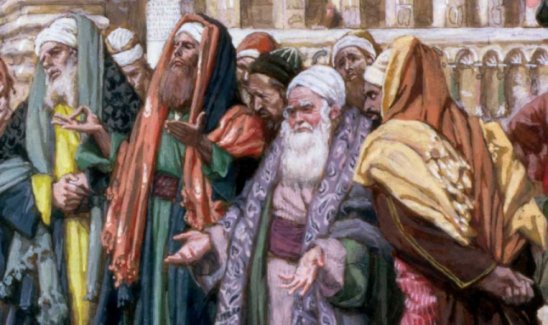 Yah'shua's healing of the leper was the first challenge to
Yah'shua's healing of the leper was the first challenge to
Jerusalem's religious and political establishment
Why the Leper Needed a Certificate of Cleanliness in Jerusalem
I am sure that Yah'shua (Jesus) not only knew that the leper would talk his mouth off but that once he had reported to his local cohen (priest), that cohen (priest) would instruct him to make the required sacrifice in Jerusalem to thank Yahweh officially and to obtain from the authorities there a certificate which he could then take back to his local community to prove that he was clean and be acceptable to live amongst them. Why would they want to know? For the obvious reason anyone would want to be sure before admitting someone back into a community who had previously had a lethal, contageous disease. If I had had Ebola and been put in quarantine in a high security hospital for months before being released, the locals here would rightly want to know what I was no longer infectious before mingling with them again. By the leper going to Jerusalem for certification, Yah'shua (Jesus) would start attracting less than friendly attention from the authorities. He knew it had to happen eventually, that the days of popularity would end, and this was probably the beginning of those days.
Howing Up the 'Learned Elders'
You'd think the religious leaders would be delighted that Yahweh was healing people but you must remember that many of the big wigs in Jerusalem had obtained their positions through political jockeying and not because of any real spirituality or calling of Elohim (God), even if they may have mastered the way to imitate spirituality by reciting long prayers, wearing long tzitzit, and so on. They had also wandered far from the emet (truth) and following their own traditions rather than the Torah in all things. Yah'shua's (Jesus) ability to heal a leper, which was unheard of, would have shown them up for their inability and inadequacy.
Summary
Let us summarise what the material we have examined up to now but especially the important things from today's passage. We have learned that:
- 1. Regular, dedicated prayer was important to Christ, and should be to us too, in establishing and maintaining our relationship with Yahweh and for the empowering and authority required for the Gospel commission devolving on all believers;
- 2. Yah'shua's (Jesus) anger, comingled with his compassion and pity, when confronted with the horror of leprosy, arose from His implaccable opposition to the combined forces of disease, death, sin and Satan;
- 3. Yah'shua (Jesus) repeatedly wished to conceal His identity as Messiah until given permission to do so by Yahweh at the appointed hour in order to fulfil a prophetic sequence of events;
- 4. The mitzvah (commandment) to carry out the requirements of the Torah demonstrated that Yah'shua (Jesus) was fully obedient to Torah, for a variety of reasons, not least of which was that He had to live it sinlessly in order to become the eternal sacrifice and atonement for sin;
- 5. The leper, through his action in having himself officially declared clean, would bear witness to everyone that there was a Power among them capable of healing leprosy, a task reputed by the rabbis of the day to be "as difficult as raising the dead" (which Christ would also do);
- 6. The cleansing of leprosy was an expected sign of the arrival of Messiah in those days since the Torah had demonstrated that it was powerless to heal this disease (hence the rabbinical saying) (Rom.8:3; Mt.11:5; Lk.7:22); and
- 7. Knowledge of the leper's healing would set the wheels of opposition in motion from the religious and political establishment that would culminate in the arrest, crucifixion, atonement and resurrection of Messiah.
Conclusion
We will continue with Chapter 2 next week. May Yahweh bless you in your studies and meditations! Amen.
Continued in Part 8
Acknowledgements
[1] Tom Wright, Mark for Everyone (SPCK, London: 2001)
[2] D.E.Nineham, The Gospel of St.Mark; The Pelican New Testament Commentaries (Penguin Books, Harmandsworth, Middlesex, England: 1972)
[3] J.C.Fenton, The Gospel According to John in the Revised Standard Version (OUP: 1979)
[4] J.R.Dummelow, The One Volume Bible Commentary (Macmillan, NY: 1975)
[5] Thomas M.Mumford, Horizontal Harmony of the Four Gospels in Parallel Columns (Deseret, SLC, Utah: 1982)
[6] Hugh Anderson, The New Century Bible Commentary: The Gospel of Mark (Eerdmans, Grand Rapids, Michigan: 1981)
[7] Ed. Gerhard Kittel, Theological Dictionary of the New Testament - 10 vols. (Eerdmans, Grand Rapids, Michigan: 1976)
[8] N.T.Wright, The New Testament and the People of God: Christian Origins and the Question of God (SPCK, London: 2013)
[9] N.T.Wright, How God Became King: The Forgotten Story of the Gospels (Harper One, NY: 2012)
[10] N.T.Wright, Jesus and the Victory of God (SPCK, London: 1996)
[11] N.T.Wright, The Resurrection of the Son of God (SPCK, London: 2003)
[12] N.T.Wright, The Challenge of Jesus: Rediscovering Who Jesus was and Is (IVP Academic, Downers Grove, Illinois: 1999)
[13] Rev.Prof.F.Davidson (ed.), The New Bible Commentary (Inter-Varsity press, London: 1953)

 V141
V141
|


